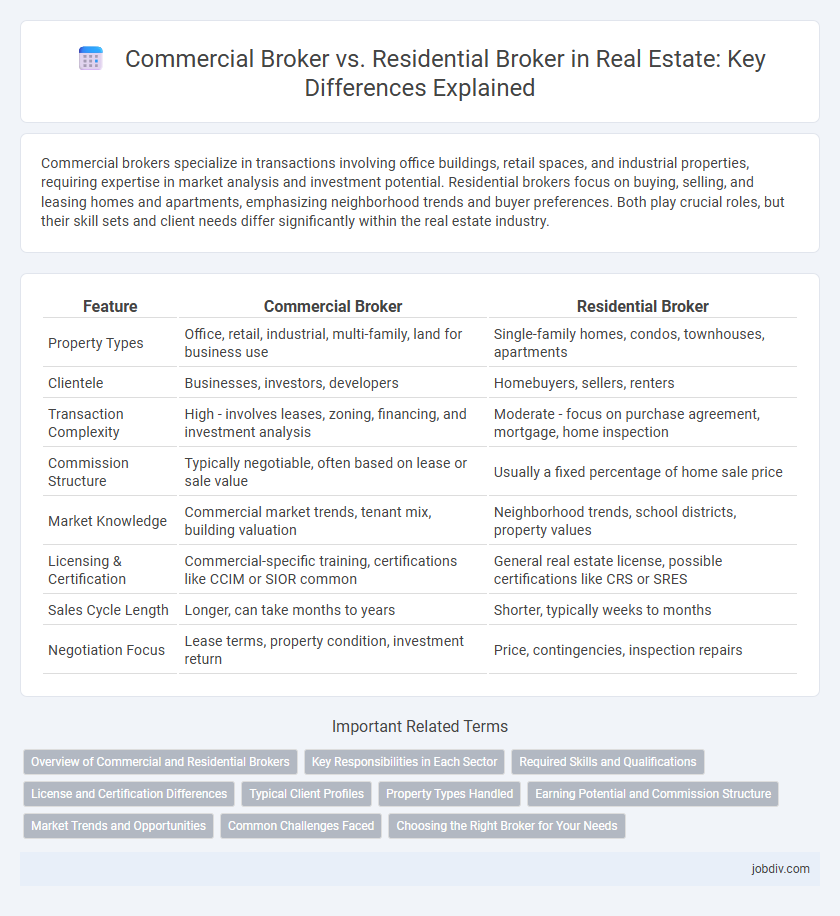Commercial brokers specialize in transactions involving office buildings, retail spaces, and industrial properties, requiring expertise in market analysis and investment potential. Residential brokers focus on buying, selling, and leasing homes and apartments, emphasizing neighborhood trends and buyer preferences. Both play crucial roles, but their skill sets and client needs differ significantly within the real estate industry.
Table of Comparison
| Feature | Commercial Broker | Residential Broker |
|---|---|---|
| Property Types | Office, retail, industrial, multi-family, land for business use | Single-family homes, condos, townhouses, apartments |
| Clientele | Businesses, investors, developers | Homebuyers, sellers, renters |
| Transaction Complexity | High - involves leases, zoning, financing, and investment analysis | Moderate - focus on purchase agreement, mortgage, home inspection |
| Commission Structure | Typically negotiable, often based on lease or sale value | Usually a fixed percentage of home sale price |
| Market Knowledge | Commercial market trends, tenant mix, building valuation | Neighborhood trends, school districts, property values |
| Licensing & Certification | Commercial-specific training, certifications like CCIM or SIOR common | General real estate license, possible certifications like CRS or SRES |
| Sales Cycle Length | Longer, can take months to years | Shorter, typically weeks to months |
| Negotiation Focus | Lease terms, property condition, investment return | Price, contingencies, inspection repairs |
Overview of Commercial and Residential Brokers
Commercial brokers specialize in facilitating transactions involving office buildings, retail spaces, industrial properties, and multi-family apartments, focusing on investment analysis, lease negotiations, and market trends. Residential brokers handle buying, selling, and leasing of single-family homes, condominiums, and townhouses, emphasizing property valuation, client preferences, and neighborhood dynamics. Both types require expertise in real estate laws, market research, and client representation but differ significantly in property types, transaction complexity, and client needs.
Key Responsibilities in Each Sector
Commercial brokers specialize in helping clients buy, sell, or lease properties used for business purposes, such as office buildings, retail spaces, and industrial properties, while managing complex transactions involving zoning regulations and market analysis. Residential brokers focus on facilitating the purchase, sale, or rental of homes and apartments, providing guidance on pricing, neighborhood trends, and client preferences. Both types of brokers conduct property evaluations, negotiate contracts, and ensure compliance with real estate laws, but their expertise diverges according to the distinct demands of commercial versus residential markets.
Required Skills and Qualifications
Commercial brokers require expertise in market analysis, financial modeling, and negotiation skills to handle complex transactions involving office buildings, retail spaces, and industrial properties. Residential brokers need strong interpersonal skills, knowledge of local housing markets, and licensing tailored to residential sales and leasing regulations. Both roles demand state-specific real estate licenses, but commercial brokers often pursue additional certifications like CCIM to enhance their qualifications.
License and Certification Differences
Commercial brokers require a specific real estate license that often includes specialized certifications such as CCIM (Certified Commercial Investment Member) or SIOR (Society of Industrial and Office Realtors) to handle complex commercial transactions. Residential brokers typically hold a general real estate license, with optional certifications like CRS (Certified Residential Specialist) that focus on buying and selling homes. Licensing for commercial brokers demands a deeper understanding of zoning laws, investment analysis, and commercial property valuation compared to residential brokers.
Typical Client Profiles
Commercial brokers typically serve businesses, investors, and developers seeking office spaces, retail locations, industrial properties, or multi-family units, focusing on lease negotiations and investment analysis. Residential brokers generally work with individual homebuyers, sellers, and renters aiming to purchase or lease single-family homes, condos, or apartments, emphasizing market trends and neighborhood amenities. Understanding these distinct client profiles helps tailor marketing strategies and client relationship management in real estate transactions.
Property Types Handled
Commercial brokers specialize in properties such as office buildings, industrial warehouses, retail centers, and multi-family apartment complexes, often dealing with larger-scale transactions and lease agreements. Residential brokers primarily focus on single-family homes, condominiums, townhouses, and small multi-unit residential buildings, catering to individual buyers and sellers. Understanding the distinction in property types handled ensures clients engage the right expertise for their real estate needs.
Earning Potential and Commission Structure
Commercial brokers typically earn higher commissions due to larger transaction values, often ranging from 3% to 6% of the sale price, whereas residential brokers generally receive 5% to 6% but on significantly lower sale prices. Commercial real estate deals may also involve tiered commission structures or fees based on lease terms, increasing earning potential through complex negotiations and multi-year contracts. Residential brokers benefit from higher transaction volume but generally face lower individual commission rates compared to the lucrative, high-stakes deals typical in commercial brokerage.
Market Trends and Opportunities
Commercial brokers specialize in high-value property transactions and benefit from market trends driven by urban development and business expansions, offering higher commission opportunities. Residential brokers focus on housing market fluctuations influenced by interest rates, population growth, and buyer demographics, capitalizing on steady demand in suburban and urban areas. Both sectors leverage technology and data analytics to identify emerging opportunities and optimize client investments.
Common Challenges Faced
Commercial brokers often encounter challenges such as managing complex lease negotiations, understanding zoning laws, and handling multi-million dollar transactions. Residential brokers frequently face obstacles like fluctuating market demand, navigating mortgage approvals, and addressing diverse client expectations. Both types of brokers must stay updated on local regulations and market trends to effectively serve their clients.
Choosing the Right Broker for Your Needs
Choosing the right broker depends on your specific real estate needs, as commercial brokers specialize in business properties like office buildings and retail spaces, while residential brokers focus on homes and apartments. Commercial brokers typically have expertise in market analysis, lease negotiations, and investment strategies, which are crucial for maximizing returns on commercial properties. Residential brokers offer in-depth knowledge of local housing markets, school districts, and community amenities, ensuring a smoother transaction for homebuyers and sellers.
Commercial Broker vs Residential Broker Infographic

 jobdiv.com
jobdiv.com